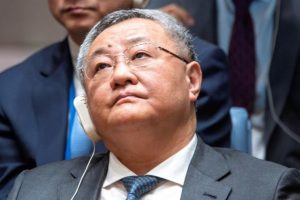The United States’ move to restrict investment in artificial intelligence in China is not helpful to “healthy development” of AI technology, according to China’s UN envoy.
UN Ambassador Fu Cong said on Monday the US move would be divisive when it comes to global governance. He made the remarks after the 193-member UN General Assembly adopted by consensus a Chinese-drafted resolution aimed at boosting international cooperation on AI capacity-building.
The resolution, which was supported by the US, urges wealthy nations to support developing nations so they have equal opportunities to use and benefit from the use of artificial intelligence.
ALSO SEE: China’s BYD Sees Solid Rise in EV Sales in Second Quarter
The UN resolution calls on the international community to “provide and promote a fair, open, inclusive and non-discriminatory business environment across the life cycle of safe, secure and trustworthy artificial intelligence systems.”

The Chinese envoy’s remarks follow the US issuing draft rules last month for banning or requiring notification of certain investments in artificial intelligence and other technology sectors in China that could threaten US national security.
“We are firmly opposed to these sanctions,” Fu Cong told reporters.
Fu said the US actions do not foster an inclusive business environment and he urged Washington to reverse its decision.
“We don’t believe that the US government’s position or decision will be helpful to the healthy development of the AI technology, per se, and will – by extension – divide the world in terms of the standards and in terms of the rules governing the AI,” he said.
The US Treasury Department published the proposed rules after US President Joe Biden signed an executive order last August as part of a broader push to prevent US know-how from helping the Chinese to develop sophisticated technology and dominate global markets.
Proposed US rule; China’s standards plan
Meanwhile, some details emerged on Monday (July 1) about the Biden administration’s proposed rule on outbound investments in China.
Davis Polk, a law firm based in New York, said the proposed rule would prohibit or impose notification requirements on investments by US citizens and entities they control in companies based in China, or owned by Chinese interests. It would target activities in chips and microelectronics, quantum information technologies, plus certain AI applications.
In related news, China’s industry ministry said in a statement on Tuesday that officials will develop more than 50 new national and industrial standards by 2026.
The goal is part of the guidelines the ministry issued on standardising systems for the artificial intelligence sector.
- Reuters with additional input and editing by Jim Pollard
ALSO SEE:
US Panel Wants Investment Ban on Critical Tech Sectors in China
China’s Bid to ‘Cheat’ a Way to Chip Prominence is Failing: Envoy
US Plans New Rules for Cloud Firms to Cut Off China AI Access
Venture Capitalists’ Backing China Put Democracy at Risk – NYP
Nvidia to Stop Some AI Chip Exports to China Immediately
China’s Military, AI Bodies Still Buying Nvidia Chips Despite US Ban
US Seeks Details on Sequoia’s Chinese Tech Investments – FT
China ‘Strongly Dissatisfied’ at US Ban on Tech Investment
























